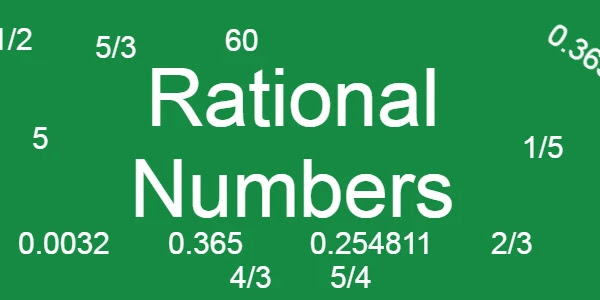WHAT ARE RATIONAL NUMBERS?
The numbers of the form a/b, where a and b are integers and b is not equal to 0 are called rational numbers. Some examples of rational numbers: 2/3, 4/1, 6/9, -1/2, etc.
Is 3 a rational number? yes, because it can be written in the form of a/b as such= 3/1

PROPERTIES OF RATIONAL NUMBERS
1) Closure Property-
i) Addition- When a rational number is added to another rational number, the sum is a rational number. Ex. 2/3+5/3=7/3, here 7/3 is also a rational number.
ii) Subtraction- When we subtract a rational number from another rational number, the difference between them is a rational number. Ex. 5/2-1/2=4/2, here 4/2 is a rational number. We can further divide 4/2 and the answer will be 2 which is another rational number as it can also be written in the form of a/b.
iii) Multiplication- When we multiply a rational number with another rational number, the product is also a rational number. ex. 6/2 x 3/5= 18/10, here 18/ 10 is a rational number.
iv) Division- When we divide a rational number by another rational number, the answer may or may not be a rational number.
2) COMMUTATIVE PROPERTY-
i) Addition- According to the commutative property, a/b + c/d = c/d=a/b. The order of numbers doesn’t affect the results here, therefore we can say that addition is commutative.
Ex. 3/2 + 5/2= 5/2 + 3/2 =8/2
ii) Subtraction- Subtraction is not commutative. Here, the order of numbers affects the results. Ex. 5/3-4/3=1/3 whereas 4/3-5/3=-1/3. Here the difference is not the same if we change the order.
iii) Multiplication- Multiplication is commutative. The order of numbers doesn’t affect the answer. ex. 2/3 x 5/3= 10/9 and 5/3 x 2/3=10/9.
iv) Division- Division is not cumulative. Here, the order of numbers does affect the answer. Ex. 6/2 divided by 4/2 is 3/2, whereas if we change the order and divide 4/2 by 6/2 the answer will be 2/3.
3)ASSOCIATIVE PROPERTY-
The associative property states that changer the grouping of three numbers will not change the answer. This property is applicable only on addition and multiplication
i)Addition- Addition is associative. Even if we change the sequence of three or more rational numbers, their sum will remain the same. Ex. 2/3 + 5/3 + 7/3=14/3 and 2/3 + 7/3 + 5/3= 14/3.
ii) Subtraction- Subtraction is not associative. If we change the sequence of three or more rational numbers, the differences between them will also change. ex. 9/2- 5/2- 3/2 = 1/2 and 5/2 – 9/2 -3/2 = -7/2
iii) Multiplication- Multiplication is associative. If we change the sequence of three or more rational numbers, the product will not change. ex. 6/5 x 4/5 x 2/5= 48/125 and even if we change the sequence, 4/5 x 6/5 x 2/5= 48/125, the product did not change.
iv) Division- Division is not associative. If we change the sequence of three or more rational numbers, the answer will also change. Ex. ( 2/3 ÷ 4/3) ÷ 5/3= 18/60 and if we change the expression to 2/3 ÷ (4/3 ÷ 5/3)= 12/10 the answer also changes.
4) DISTRIBUTIVE PROPERTY-
i)Multiplication over Addition- Multiplication over addition is distributive. It means that an equation like this= a (b+c)can be written as=ab +ac.
ii) Multiplication over subtraction- Multiplication over subtraction is distributive. It means that an equation like this: a(b-c) can be written like this: ab-ac.
iii) Distributive property is not applicable on multiplication over division.
You can use the doubt buddy app to solve more doubts related to maths or any other subject. it is one of the best doubt-solving apps for every student and provides instant solutions to your problems. You can also connect with the best tutors for guidance.
Download the doubt buddy app: https://play.google.com/store/apps/details?id=com.doubtbuddy.student&hl=en_IN&gl=US
Check out more articles from us- https:blog.doubtbuddy.com



